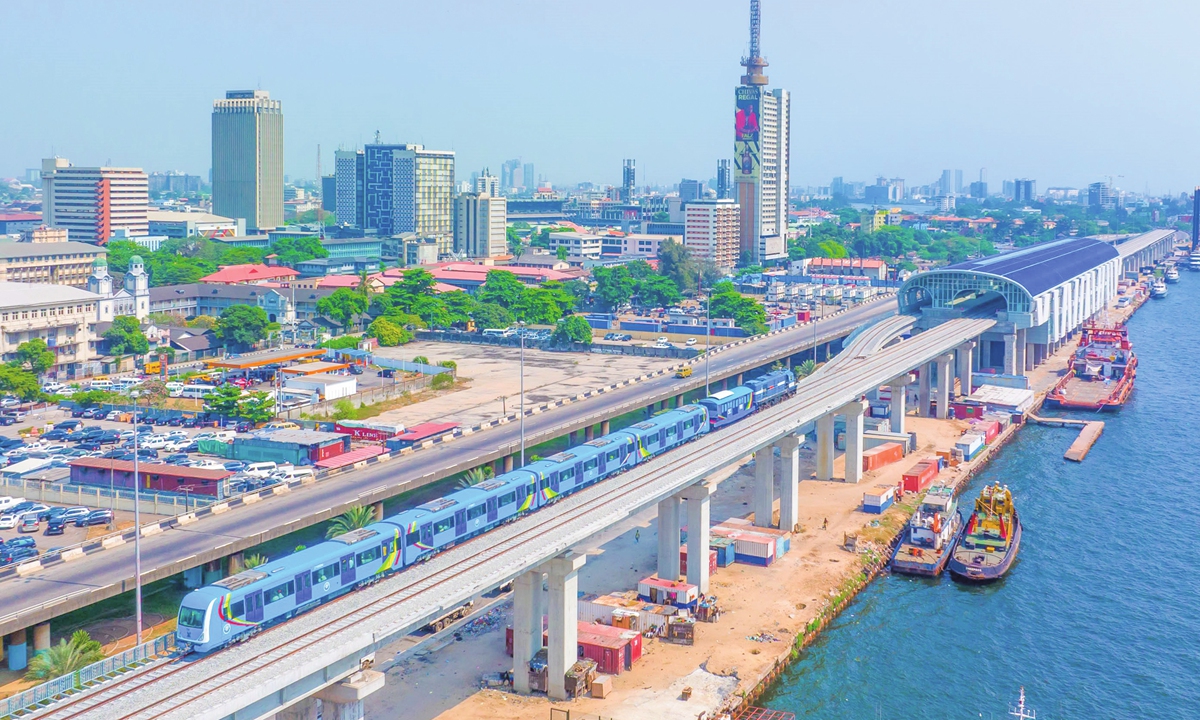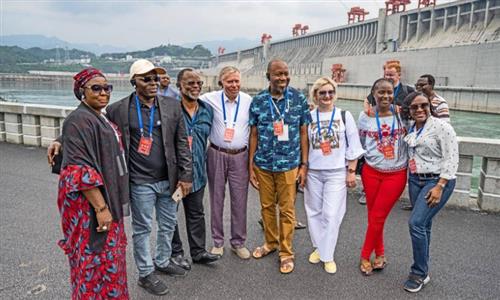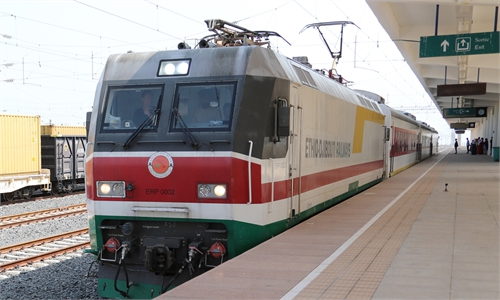China and Africa head toward another decade of opportunity built on strong mutual trust and cooperation under BRI


A train of a light rail project undertaken by a Chinese firm runs during a completion ceremony in Lagos, Nigeria on December 21, 2022. Photo: Xinhua
A decade of Belt and Road Initiative (BRI) construction that has seen ports and rail emerging across the African continent has laid down a solid foundation for the BRI to grow further over the next decade, with enhanced mutual trust being likely the most precious heritage, and the potential to tap into China-Africa economic and trade cooperation is just tremendous, Chinese business executives and experts have claimed.
This year marks the 10th anniversary of the China-proposed BRI. Over the last decade, Africa has become a manifestation of how the BRI delivers win-win cooperation results, benefiting China, Africa as well as the rest of the world.
China and African countries have witnessed more frequent high-level exchanges in recent weeks. At the end of May, Special Envoy of Chinese President Xi Jinping and Vice Chairman of the Standing Committee of the National People's Congress Peng Qinghua attended Nigerian President Bola Tinubu's inauguration ceremony in the capital of Nigeria, Abuja.
This follows the visits recently made by leaders and foreign ministers from a number of African countries, including the Democratic Republic of the Congo, Eritrea, Ethiopia and Sierra Leone.
"The world today faces many challenges. Being the world's largest developing country and the continent home to most developing countries, China and Africa require solidarity and cooperation more than ever," Chinese Foreign Ministry spokesperson Mao Ning told a regular press conference on May 29.
'Meant to deliver'
Chinese business executives and experts said enhanced trust built up through years of hardship is an asset that will play a vital role in BRI's future development on the continent.
"In the past decade, we have been with our customers through thick and thin, and we always deliver in the end. Because we mean to," Wang Jinglian, general manager of China Railway Construction Corp (Algeria) Ltd, told the Global Times on Thursday.
Over past decades, Chinese construction giant China Railway Construction Corp (CRCC) has built highways stretching across Algeria. They have also built residential zones which the government has used as affordable housing for local residents.
Wang recalled how in the beginning his customers held a reserved opinion toward Made-in-China products and how recognition was gradually forged over the years.
This level of trust is perhaps the most valuable asset during the past decade, and will be carried into the future, playing a fundamental role over the coming decade in which great opportunities lay ahead of us and our African partners in mutually beneficial cooperation, Wang said.
A decade of BRI construction in Africa has changed the continent's skylines, shorelines and rooflines. Over the last decades, China has helped African countries build over 6,000 kilometers of railway, 6,000 kilometers of road, around 20 ports, over 80 large power facilities, and more than 130 hospitals and 170 schools, according to media reports.
As of the end of 2020, China's stock of direct investment in Africa had topped $56 billion, most of which was in industrial parks and factories, helping relevant African countries form industrial prototypes in the fields of building materials, light industry, home appliances, and even creating export income.
He Wenping, director of the African Studies Section at the Institute of West Asian and African Studies under the Chinese Academy of Social Sciences, said the most important achievement of BRI in Africa during the past 10 years is that a vast number of projects have been delivered on the continent.
"People can see it with their own eyes and feel the positive contribution to the local and even global economy," He told the Global Times on Thursday.
New chapter unfolding
BRI investment does not only have eyes on the present, but also the future by fostering sustainable business development, the green economy, health industry, and the digitalization of Africa, experts said. The opportunity for industrial cooperation and for third-markets is also substantial.
Deepening financial cooperation from funding to local currency settlement will also play an increasing role in China-Africa trade and economic relationships.
Yiwu, China's small commodities hub and the world's largest small-commodities market, has recently opened a China-Africa cross-border yuan settlement center to facilitate trade, boost clearing functions and reduce exchange rate costs and risk.
Many African countries are short of foreign exchange reserves and the settlement of local currencies will be a helpful means to help trade, He said. While in the long-run, the large volume of trade between China and African countries will guarantee the gradual success of the yuan's internationalization.
CRCC's Wang said that many African countries have immense resources and this would provide the foundation for larger trade figures and deeper industrial cooperation.
"Also, I have seen Chinese private companies coming in large numbers to North African countries in recent years," the executive said, noting that the products produced here enjoy zero-tariffs in the European market.
Sarah Wang, executive director of Beijing Wise Century Trading Co, is a Chinese business woman who spent the past decade traveling and doing business in Africa. Last year, she brought African products made in countries including Sudan to the 5th China International Import Expo in Shanghai.
Sarah Wang believes there are tremendous opportunities in the field of agriculture cooperation, among others.
"China already has quite advanced, smart agriculture, assisted by high-tech equipment such as automated machines and drones," Wang noted. "If such technology can be introduced to African farms, great results can be expected."
In Mozambique, bilateral cooperation on rice production has yielded promising results, Sarah Wang said, noting that cooperation over food production has special significance for many African countries in terms of food security and exports.
The same is true for coffee production. Many African countries such as Ethiopia and Kenya are major coffee producers and China could bring processing plants to Africa and set up part of the industrial chain, Wang said.
Experts noted geopolitics and great power competition will continue to have an effect on China-Africa cooperation.
In her recent trip to Africa, US Vice President Kamala Harris continued to point fingers on the African debt issue and China's alleged role in it, despite these claims being baseless. Western countries have also come up with their own infrastructure development plans such as the Global Gateway to woo countries.
"Looking at the next decade, it is essential to make sure the development of BRI projects is sustainable, and is able to generate enough benefits," He said.
China and Africa will join hands to practice true multilateralism, firmly safeguard each other's legitimate and lawful rights and interests, actively advance our respective modernization with distinctive features, Mao said.
China has been Africa's largest trading partner for 13 consecutive years since 2009, and the trade volume between China and Africa exceeded $260 billion in 2022.
A total of 52 African countries and the African Union Commission have signed "Belt and Road" cooperation documents with China.



